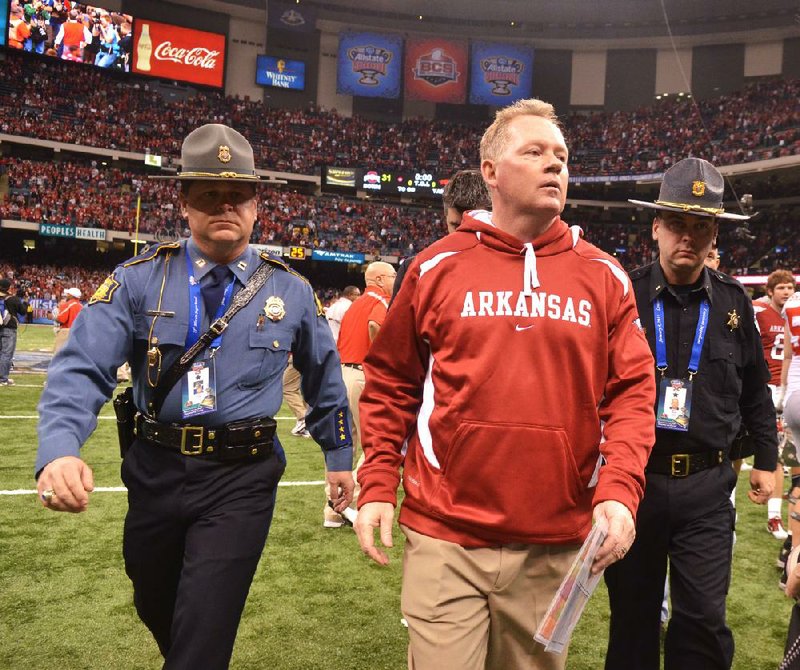LITTLE ROCK — The Arkansas State Police has established a policy for its employees who provide security at athletic events after one of its captains received an ethics sanction over gifts from a university football program.
The two-page policy states that personnel assigned to provide security during athletic events and travel “will not receive any compensation other than regular on-duty State Police salary.”
The new policy was distributed to all state police employees Friday morning, spokesman Bill Sadler said.
Sadler said the agency believes the policy is unique to Arkansas. It focuses on rules for athletic-event security, including gifts, exceptions for transporting athletes or athletic officials, and rules for attire and out of-state travel.
“Such a policy did not exist prior to the Petrino incident,” Sadler said in an interview, referring to former University of Arkansas head football coach Bobby Petrino, who was fired April 10 after failing to disclose details regarding his highly publicized April 1 motorcycle crash.
State police Capt. Lance King, who had coordinated security for Petrino, drove Petrino to a Fayetteville hospital after the accident.
King also manages state police Troop L, with headquarters in Springdale, that investigated the crash.
Sadler previously said state police determined King didn’t violate any state laws in responding to Petrino’s post-crash phone call seeking help and in providing a lift to the hospital, an assertion the agency still maintains.
In May, the Arkansas Democrat-Gazette reported that King had filed a complaint against himself with the Arkansas Ethics Commission concerning gifts he accepted from the University of Arkansas football program.
For four days after the crash, Petrino failed to disclose to his athletic department supervisor that he had a passenger, a 25-year-old female university employee, on the motorcycle with him.
Just prior to the state police’s April 5 release of the accident report listing Jessica Dorrell as the passenger, Petrino admitted to Athletic Director Jeff Long that she was at the accident scene and also apologized for a “previous inappropriate relationship” with her.
Then in July, the Ethics Commission ruled that King violated state law when he accepted gifts valued at more than $4,000 from the Razorback program between January 2011 and January 2012. The gifts included season football tickets, bowl tickets and a Sugar Bowl ring valued at $225.
The commission issued a “public letter of caution” to King, one of its mildest sanctions.
“There was job action taken involving Capt. King,” Sadler said, adding he couldn’t elaborate on the personnel matter other than to say it didn’t involve suspension or termination.
King didn’t return phone messages left at his Troop L office Friday.
Kevin Trainor, the athletic department’s chief spokesman, said last month it was reviewing the Ethics Commission’s letter to King and assessing what, if any, actions needed to be taken in response.
Friday afternoon, Trainor offered only a brief written statement about the day’s development.
“We appreciate the diligence of the Arkansas State Police in developing a detailed written policy to establish the protocol for Arkansas state troopers and their commanders for athletic events,” he said. “Razorback athletics will continue to be fully supportive of the Arkansas State Police and all of the procedures it has set for its personnel.”
Until now, state troopers and commanders assigned to security details for “any statewide function” under Arkansas Code Annotated 12-8-109 had no written guidance regarding gratuities, Sadler said.
“Early on in the news coverage, we kept getting asked for our policy. We had no policy,” he said.
“As the circumstances began to play out, we made the statement that we would develop a policy.”
The agency is now proud to have done so, he said. As it began developing the new protocols, it discovered other states also lacked such policies.
“Now we have something that may well be the very first in the country, that spells out the do’s and don’ts,” Sadler said.
The state police has a four-page “Code of Ethics” that each agency employee must sign. Though it doesn’t address athletic event security specifically, it does forbid employees from accepting gifts, entertainment, personal favors and preferential treatment “that could influence, or appear to influence, their decisions in performing their job functions,” as well as a section forbidding “kickbacks and prohibited commissions.”
The new policy limits the athletic security assignments to on-duty personnel only.
It forbids state police employees from contracting security services with or accepting gratuities from guest athletic teams.
It also prohibits using state police vehicles for transporting athletic team staff or team members “unless during the course of their duties ... a state trooper reasonably believes it may become necessary to provide an additional level of security or emergency transportation.”
Amid talk that the football sideline security detail is a coveted job, Sadler said people probably don’t realize that Arkansas Code Annotated 12-8-109 states that state police “shall provide police protection” at statewide functions sponsored by state entities, state-supported colleges, universities and public schools, or at private functions on public property.
“As we looked at that, that makes it very clear that that’s a mandate,” Sadler said.
Front Section, Pages 1 on 08/04/2012

